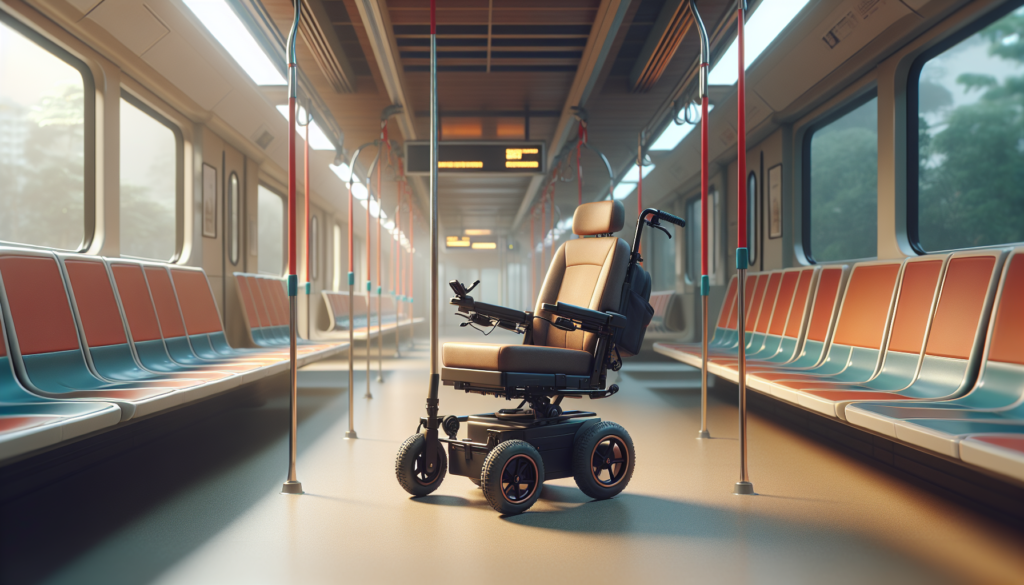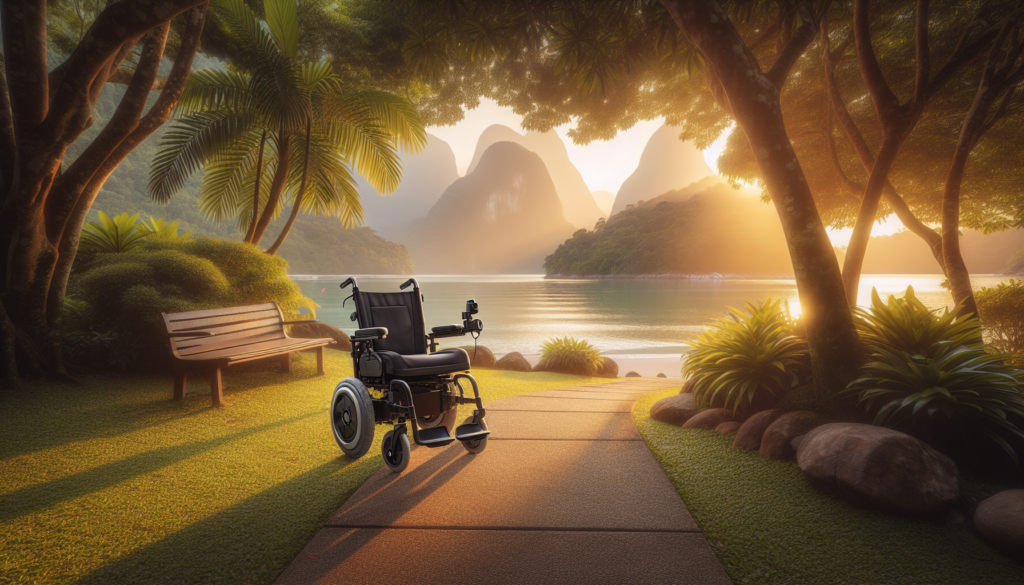
In the world of mobility solutions, electric wheelchairs stand out as a quintessential choice for independence and ease of navigation. With various models designed to cater to different needs, making a choice between a lightweight electric wheelchair and a heavy-duty electric wheelchair can be quite challenging. Lightweight models like the Edegree EW6 from EKO Life MY, which offers a convenient 10-15 km range with a max load of 100kg, are excellent for those seeking portability and ease of use, weighing only 14.8kg.
On the other hand, heavy-duty options like the Stonbike TU-04 excel in durability and power, providing a robust 25 km range and accommodating a greater max load of 150kg, although at the weight of 28kg. This blog will dive deep into the advantages and limitations of both categories to help you make an informed decision on the best electric wheelchair for your needs.
Overview of Electric Wheelchairs
Electric wheelchairs have revolutionized mobility for individuals with varying needs, presenting a choice between lightweight and heavy-duty options to cater to different lifestyles. Lightweight electric wheelchairs, such as the Edegree EW6, offer impressive portability with a compact build weighing just 14.8 kg. They deliver a range of 10-15 km on a single charge, making them ideal for short-distance travel. Their 24v 10AH lithium battery provides ample energy, while a maximum load of 100 kg ensures that users can comfortably navigate daily errands. With a forward speed of 0-8 km/h and five-speed modes, users can seamlessly adapt their pace while benefiting from a notable climbing ability of less than 10°, which is perfect for mild inclines.
On the other hand, heavy-duty electric wheelchairs, like the Stonbike TU-04, are designed to provide robust support and enhanced performance for those who require greater stability and durability. Weighing 28 kg, this model has a superior range of 25 km per charge, making it suitable for extended outings. With a maximum load capacity of 150 kg and a powerful dual motor of 24v250w, the Stonbike excels in climbing inclines up to 25°, providing users access to a broader range of terrains. This comparison highlights the unique benefits that both lightweight and heavy-duty electric wheelchairs bring to users, informing their decisions based on personal mobility needs.
Weight Comparison: Lightweight vs Heavy-Duty Models
When it comes to choosing between lightweight and heavy-duty electric wheelchairs, weight is a significant factor that directly influences usability and mobility. The Edegree EW6 is a prime example of a lightweight electric wheelchair, weighing in at just 14.8 kg, making it easy to transport and maneuver. This model, equipped with a lithium battery and offering a range of 10-15 km per charge, provides a practical solution for users seeking portability without compromising on performance. With its maximum load capacity of 100 kg and moderate climbing ability, the EW6 is ideal for individuals looking for a balance of convenience and reliability in everyday settings.
On the other side of the spectrum, heavy-duty models like the Stonbike TU-04 present a completely different use case. Weighing 28 kg, the TU-04 is designed to support a robust maximum load of 150 kg, making it suitable for users who require additional strength and stability. With a climbing ability of 25° and a range of 25 km per charge, this model is tailored for those who need enhanced durability and performance for outdoor adventures or more demanding environments. Overall, the weight comparison between these two electric wheelchair models highlights the distinct advantages of each, catering to various user needs and preferences.
Battery Performance: Range and Charging Times
When considering battery performance in electric wheelchairs, the range per charge and charging times play crucial roles in user convenience and mobility. The Edegree EW6, a lightweight model, offers a range of 10-15 km per charge, which is suitable for short trips or uses in compact spaces. However, its charging time can take between 6 to 8 hours, making it less ideal for those needing to use the wheelchair multiple times throughout the day. Weighing in at 14.8 kg with the battery included, this model is designed for ease of transport but may require more frequent charging for longer outings.
In contrast, the Stonbike TU-04, while heavier at 28 kg, boasts a significantly better range of 25 km per charge, allowing users to travel greater distances without the worry of running out of battery. The charging time for the TU-04 is also more efficient, taking only 3 to 5 hours to fully charge. This feature is particularly beneficial for heavy-duty users who need reliable and robust performance in various settings. Ultimately, while the Edegree EW6 caters to short-distance use, the Stonbike TU-04 stands out with superior battery performance and convenience for users requiring more extensive mobility.
Speed and Mobility: Forward and Reverse Speed Capabilities
When comparing electric wheelchairs, understanding speed and mobility is crucial for potential users. The Edegree EW6 offers a forward and reverse speed of up to 8 km/h, ensuring swift movement within tighter spaces and short distances. Weighing only 14.8 kg, this lightweight option allows for easier maneuverability, making it an excellent choice for those seeking agility in their day-to-day navigation. Its five-speed gear mode also enhances control, especially in varying terrains, while maintaining a moderate climbing ability of less than 10°.
On the other hand, the Stonbike TU-04 serves as a heavy-duty option with impressive speed capabilities, supporting a maximum forward and reverse speed of 6 km/h. Even though its speed is slightly lower than the Edegree, the Stonbike boasts a more robust structure weighing 28 kg, which enables it to carry a maximum load of 150 kg. This makes it particularly suitable for users requiring extra support or stability. Additionally, the Stonbike’s climbing ability of up to 25° degree makes it a solid choice for tackling steeper terrains, providing a unique edge in mobility for those who need it most.
Climbing Ability: Navigating Different Terrains

When it comes to climbing ability, electric wheelchairs offer differing performances based on their designs and specifications. The Edegree EW6, a lightweight electric wheelchair, boasts a climbing ability of less than 10°. This feature makes it a suitable option for users who predominantly navigate flat terrains or gentle slopes, providing a smooth experience with minimal exertion. Its dual motor system delivers sufficient power to traverse mild inclines while maintaining a forward speed of up to 8 km/h. Although it may struggle on steeper hills, the EW6 excels in portability and ease of use for daily activities, ensuring users can access everyday environments with comfort.
In contrast, the Stonbike TU-04 presents a notable advantage in climbing capability, featuring the ability to tackle slopes of up to 25°. This heavy-duty electric wheelchair is specifically designed for users who might encounter various terrains, including steep hills and rugged paths. The enhanced dual motor power of 24V 250W provides ample strength for climbing, ensuring a reliable performance with a maximum load of 150 kg. Furthermore, the Stonbike TU-04 combines this climbing prowess with a solid battery life, allowing users to confidently explore diverse landscapes without concern for battery depletion or weight limits.
Max Load Capacity: Choosing the Right Wheelchair for Your Needs
In addition to load capacity, it’s important to consider the overall weight of the electric wheelchair. The Edegree EW6’s lightweight nature enhances portability, ideal for those who need to navigate various environments smoothly. In contrast, the Stonbike TU-04, despite its heavier weight of 28kg, offers robust construction and sturdier performance, especially for outdoor trails or uneven terrains with its impressive climbing ability of up to 25 degrees. Ultimately, choosing between a lightweight and a heavy-duty electric wheelchair boils down to your personal requirements regarding usability, transport, and maximum weight capacity.
Gear Options and Control: Understanding the 5 Speed Modes
When choosing an electric wheelchair, understanding the gear options and control is crucial for optimizing performance and comfort. Both the Edegree EW6 and Stonbike TU-04 models are equipped with a 5-speed mode system. This allows users to adjust their speed according to their needs and surroundings, promoting a smooth and controlled ride. The Edegree EW6 offers a forward speed that ranges from 0-8 km/h and is primarily designed for users who navigate through diverse terrains and require quick adjustments as they encounter obstacles.
In contrast, the Stonbike TU-04 offers a slightly lower maximum speed of 0-6 km/h, which can provide a more stable experience for those who prefer leisurely strolls on flat surfaces or a more controlled pace during their rides. The ability to switch between different speeds can significantly improve accessibility and safety while maneuvering in various environments. Additionally, the weight of each wheelchair can impact overall performance and ease of control. The Edegree EW6 is a lightweight option at 14.8 kg, making it easier to handle and transport, especially for users with limited upper body strength.
On the other hand, the Stonbike TU-04, though heavier at 28 kg, is engineered to support a greater maximum load of 150 kg, making it suitable for heavier users or those requiring more robust support. The combination of gear options and the overall weight of the wheelchairs creates a balance between control and capability, catering to the distinct needs of various users. Choosing the right gear option can elevate the experience, making it essential for potential buyers to weigh the functionalities of each model carefully.
Pricing Analysis: Value for Money in Electric Wheelchairs
When considering electric wheelchairs, pricing can significantly influence the decision-making process. For instance, the Edegree EW6 is priced at RM 4,388 and is lauded for its lightweight design at just 14.8kg, making it an ideal option for those who prioritize mobility and ease of transport. It features a lithium battery delivering a range of 10-15km per charge, with a relatively longer charging time of 6-8 hours.
In contrast, the Stonbike TU-04 is available at a more budget-friendly price of RM 3,600, providing a sturdier option at 28kg. This heavier wheelchair boasts a superior range of 25km and a shorter charging time of 3-5 hours, appealing to those needing a more robust solution for longer journeys. Both models come equipped with dual motors, yet they target different customer needs, reflecting their respective price points.
Choosing the Right Electric Wheelchair for Your Needs

In conclusion, the choice between a lightweight electric wheelchair, like the Edegree EW6, and a heavy-duty option, such as the Stonbike TU-04, largely depends on individual needs and lifestyle. If portability and ease of transport are your main priorities, the Edegree EW6 excels with its compact design, lighter weight, and adequate range for short outings. Its lower payload capacity may limit use for some, but it remains a standout for those who prioritize mobility and convenience over heavy-duty performance.
On the other hand, if you require an electric wheelchair that can handle rough terrains, carry heavier loads, and support more robust features, the Stonbike TU-04 is your best bet. With a superior range per charge and impressive climbing ability, it’s designed for those who need durability and strength. Weighing more, it offers features that make it a formidable option for those requiring additional support. Ultimately, understanding personal needs and assessing these specifications will guide you to the ideal electric wheelchair that fits your lifestyle perfectly.

It seems like the author wants to leave us hanging, can’t wait for the full post!
We appreciate your enthusiasm for the upcoming post! Don’t worry, we’ll make sure to provide a detailed and informative article. If you have any questions or topics you’d like to see covered, feel free to reach out to us at [email protected] or +60 3-7890 3042. We look forward to your feedback!
I’m curious about the post now, the summary has sparked my interest, want to know more!
Hi Mohammed, we’re glad you found the summary interesting! We’d be happy to share more about our products and services at Eko Life Malaysia. Please feel free to contact us at [email protected] or +60 3-7890 3042. We look forward to hearing from you!
I find the blog summary very vague, hope it gets more detailed in the post
Hi Nurul Rahmad, thank you for sharing your thoughts on our blog summary. We understand that detail is crucial in engaging our audience, and we’ll definitely strive to provide a more in-depth post for you. If you’d like to provide more feedback or suggestions on what topics you’d like to see, please feel free to share them with us. You can contact us via email at [email protected] or give us a call at +60 3-7890 3042.